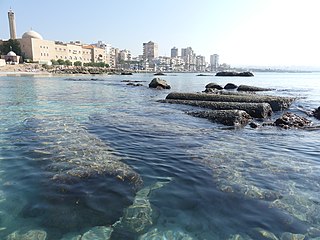
Tyre is a city in Lebanon, and one of the oldest continuously inhabited cities in the world. It was one of the earliest Phoenician metropolises and the legendary birthplace of Europa, her brothers Cadmus and Phoenix, and Carthage's founder Dido (Elissa). The city has many ancient sites, including the Tyre Hippodrome, and was added as a whole to the list of UNESCO World Heritage Sites in 1984. The historian Ernest Renan noted that "One can call Tyre a city of ruins, built out of ruins".
Qana, also spelled Cana, Canna or Kana, is a municipality in southern Lebanon located 10 kilometres (6.2 mi) southeast of the city of Tyre and 12 kilometres (7.5 mi) north of the border with Israel, in an area historically known as Upper Galilee. Qana is known for its antiquity, as well as possibly being the place where Jesus of Nazareth and his mother Mary visited and attended a wedding. It is revered by Lebanese Christians and Muslims alike.
An-Naqoura is a municipality in southern Lebanon. Since March 23, 1978, the United Nations Interim Force in Lebanon (UNIFIL) has been headquartered in An-Naqoura.

Ayta ash-Shaab is a municipality located in southern Lebanon, about 2.22 km northeast of the Israeli border. The majority of its population are Shia Muslims.

The Tyre District is a district in the South Governorate of Lebanon.
The Iran–Israel conflict during the Syrian civil war refers to the Iranian–Israeli standoff in and around Syria during the Syrian conflict. With increasing Iranian involvement in Syria from 2011 onwards, the conflict shifted from a proxy war into a direct confrontation by early 2018.

Shamaa is a village and municipality in the Tyre District of Lebanon's South Governorate, about 25 kilometres southeast of Tyre and some 99 kilometres south of Beirut.
The ruins of Tyre, are a collection of archaeological sites in the city of Tyre, in Southern Lebanon. Since the 1940s, the Lebanese government has been carrying out extensive excavation campaigns in the area of the Phoenician city in search of the city's antiquities and history. In 1979, the United Nations UNESCO organization included the city of Tyre on the list of World Heritage Sites.
This timeline of the Israel–Hezbollah conflict covers the period from 2 January 2024, with the Assassination of Saleh al-Arouri, until 31 March 2024, one day prior to the Israeli airstrike on the Iranian consulate in Damascus.
This timeline of the Israel–Hezbollah conflict covers the period from 1 April 2024, when Israel struck the Iranian consulate in Damascus, to 26 July 2024, one day before the Majdal Shams attack.
This timeline of the Israel–Hezbollah conflict covers the period from 27 July 2024, when a Hezbollah rocket struck a soccer field in Majdal Shams in the Golan Heights, killing 12 children, to 16 September 2024, one day before the explosion of Hezbollah pagers and walkie talkies.
On 23 September 2024, Israel began a series of airstrikes in Lebanon as part of the ongoing Israel–Hezbollah conflict with an operation it code-named Northern Arrows. Since then, Israel's attacks have killed over 800 people, injured more than 5,000, and displaced hundreds of thousands of Lebanese civilians. The attacks are the deadliest in Lebanon since the end of the Lebanese Civil War, and began five days after Israel performed a deadly pager and walkie-talkie attack on devices intended for Hezbollah members, and three days after Israel performed an airstrike on an apartment complex in Beirut which killed Redwan Force commander Ibrahim Aqil as well as 54 others.
This timeline of the Israel–Hezbollah conflict covers the period that begins 17 September 2024, when Hezbollah pagers exploded throughout Lebanon and Syria, and ends prior to 27 November 2024, when the 2024 Israel–Lebanon ceasefire agreement was signed. Beginning 23 September, Israel began its airstrikes in Lebanon, on 27 September, they assassinated Hassan Nasrallah, and on 1 October, they invaded Lebanon.

On 1 October 2024, Israel invaded Southern Lebanon, marking the sixth Israeli invasion of Lebanon since 1978. The invasion took place after nearly 12 months of Israel–Hezbollah conflict. On 26 November, Israel and Lebanon signed a ceasefire agreement, mediated by France and the United States. The ceasefire went into effect on 27 November, though some attacks continue.

On 28 October 2024, the Israel Defense Forces conducted a series of airstrikes on roughly a dozen settlements in the Beqaa Valley in Lebanon, killing at least 134 people and leaving at least 117 others injured. Follow-up airstrikes on two villages killed at least nineteen more on 30 October, with "dozens" more being killed on 2–3 November. The airstrikes were described by regional governor Bachie Khodr as the most intense in the area since the start of Israeli–Hezbollah escalations in September 2024.

"Operation Tyre" was a suicide attack against the Israel Defense Forces (IDF) in the city of Tyre during the 1982 Lebanon War. It was carried out by Ahmad Jafar Qasir, a Lebanese Shia Muslim who drove an explosive-laden Peugeot 504 towards the IDF command centre in the city. As many as 102 people were killed in the attack, while another 55 were wounded and 10 missing. Responsibility for the car bombing, which preceded another one in November 1983, was attributed to the Iran-backed Lebanese militant organization Hezbollah.

The 2024 Israeli invasion of Lebanon caused damage to or destroyed various cultural heritage sites, up to the scale of the destruction of entire historic villages.
This timeline of the Israel–Hezbollah conflict covers the period from 27 November 2024, when the 2024 Israel–Lebanon ceasefire agreement was signed, to the present.








